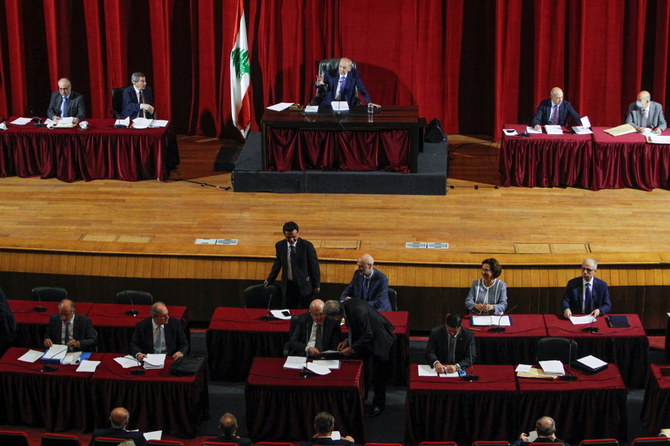Lebanon will witness parliamentary elections on 15 May for the first time after the outbreak of the popular revolution on 17 October 2019, against the ruling class in the country.
The deadline for candidacy is 60 days before the election according to electoral law, and each candidate must meet the criteria to run in the elections.
Many current politicians and parliamentarians were put on the US sanctions lists, so will this affect their ability to run in the parliamentary elections in the country?
In 2019, the US Department of the Treasury imposed sanctions on the head of the Loyalty to the Resistance Bloc (affiliated with Hezbollah), MP Muhammad Raad, claiming that through his position he supervises the implementation of Hezbollah’s agenda and policies in the Lebanese parliament.
In addition to Raad, Washington imposed sanctions on MP Amin Sherri (from the same bloc), noting that he threatened officials in a Lebanese bank and their families after the bank froze the accounts of Hezbollah members, who had been placed on the American blacklist.
In 2020, Washington imposed sanctions on two former ministers, Ali Hassan Khalil from the Amal Movement affiliated with Nabih Berri, and Youssef Fenianos from the Marada movement led by Suleiman Franjieh, on allegations of their involvement in corruption and support for Hezbollah.
Sanctions were also imposed on the head of the Free Patriotic Movement, MP Gebran Bassil (Hezbollah’s most prominent ally), because of his role in spreading corruption in the country, according to Washington.
The last chapter of the sanctions was in 2021, with the US listing MP Jamil Al-Sayed (close to Hezbollah) on the list, on suspicion of corruption and contributing to undermining the rule of law in Lebanon.
It is worth noting that Washington imposes successive sanctions on those close to Hezbollah, regardless of their position in the Lebanese state, given that it does not differentiate between the political and military activities of the party.
Hezbollah has a military wing, and its forces are deployed inside Lebanon and in Syria, and it also participates in Lebanese political life through its representation in the current government through two ministers. It also has a parliamentary bloc called the Loyalty to the Resistance bloc, which consists of 12 parliamentarians.
The head of JUSTICIA Foundation for Development and Human Rights, a private foundation, professor of international law, Paul Morcos, told Anadolu Agency that any Lebanese citizen can run for parliamentary elections as long as they have not been stripped of their civil rights in their country.
Being stripped of civil rights means exclusion from all public servant jobs and services and services in the administration of the sect or union to which they belong, in addition to banning them from running and voting in elections among other things.
There are no obstacles to candidacy
Constitutional expert Adel Yammine reveals that “there is nothing in the Lebanese Parliamentary Elections Law and its amendments that prevents anyone who meets the legal requirements from running for elections, even if US administrative and political sanctions are imposed on them.”
He explained that “American law does not apply in the Lebanese territories, and therefore the US sanctions will not prevent them from running for the upcoming legislative elections.”
Yammine’s words are consistent with Morcos, who asserts that “there is nothing in Lebanese law that prevents anyone who has been placed on the US sanctions list from running in parliamentary elections.”
In 2017, Washington imposed sanctions on MP Asaad Hardan (Syrian Social Nationalist Party) and former minister Wiam Wahhab (Arab Tawhid Party), but the former ran for parliamentary elections in 2018, and today he is an MP while the latter did not succeed in securing a seat in parliament.
READ ALSO: How China reacts to the Russia-Ukraine crisis
One of the measures that follow the US sanctions is that the individuals cannot open bank accounts.
At the same time, one of the conditions for running for the elections is that the candidate submit a bank statement proving the opening of the electoral campaign account. However, the Lebanese authority found a solution to this dilemma before the 2018 elections.
Yammine says that “in the event that the candidate is unable to open a bank account to run for the parliamentary elections, the electoral law has found a way out for such a case,” explaining that “a person wishing to run can open an account with the Lebanese Ministry of Finance, as an alternative to the bank account required in order to run for elections.”
As a result, US sanctions do not stand in the way of the candidacy of any of those on its lists for the Lebanese parliamentary elections.













